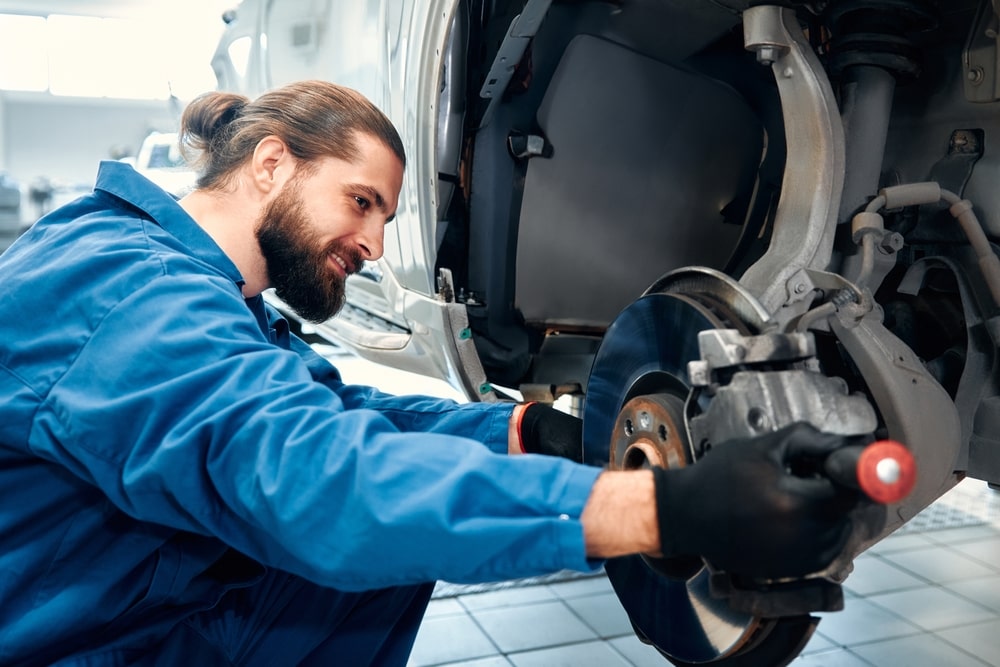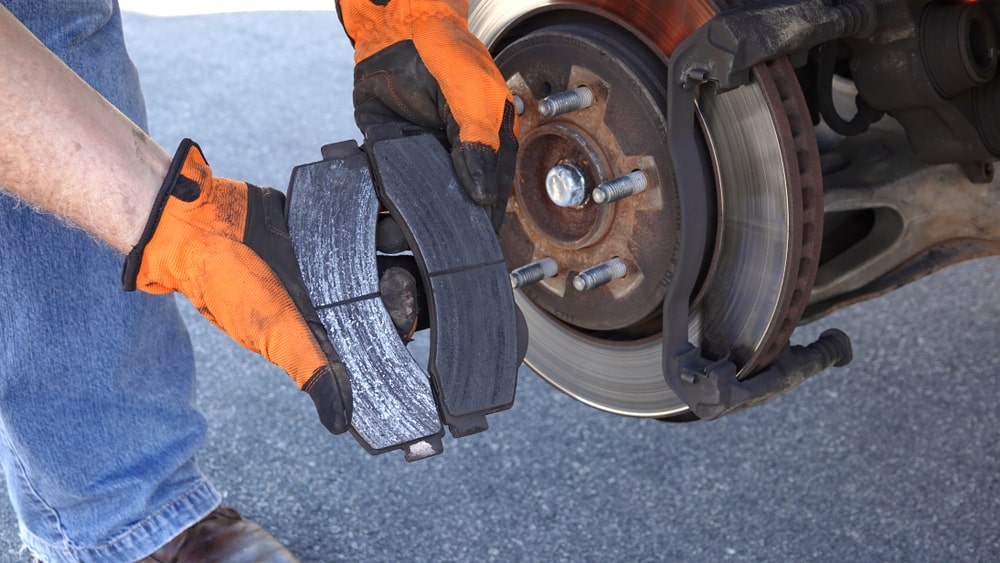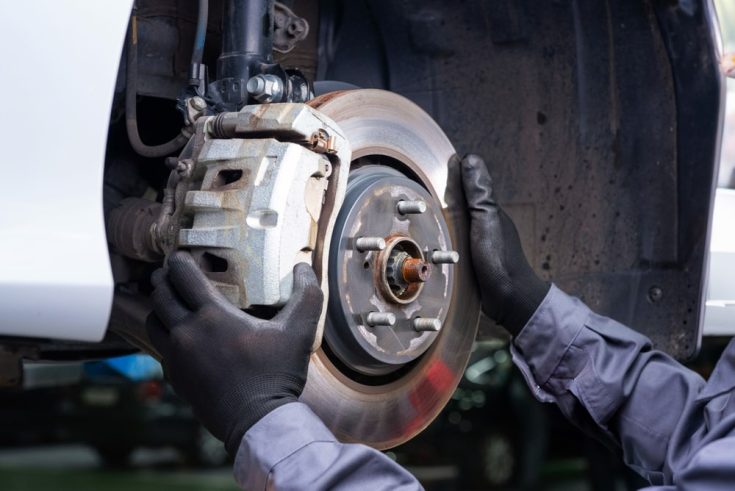Your vehicle’s brakes are the most important safety feature you rely on every day. Brake pads, in particular, bear the brunt of the braking process and wear out over time. Ignoring the warning signs of worn brake pads can lead to costly repairs or even unsafe driving conditions.
At EZ-Brakes, we specialize in convenient and reliable mobile brake pad replacement services, ensuring that you stay safe on the road without disrupting your schedule. This guide will help you recognize the five key signs that it’s time to replace your brake pads and provide answers to common questions about changing brake pads.
1. Squeaking or Squealing Sounds
Your first warning of brake pad wear.
One of the earliest signs that you need a brake pad replacement is a persistent squeaking or squealing noise when you press the brake pedal. Brake pads are often equipped with a wear indicator, a small metal tab that makes a high-pitched noise when the pads are nearing the end of their lifespan.
Ignoring this sound can lead to more serious problems, such as damage to the rotors, which are much more expensive to repair or replace. If you’re hearing these noises, don’t delay—schedule a brake pad replacement mobile service with EZ-Brakes for fast and convenient repairs.
2. Grinding or Growling Noises
Metal-on-metal contact is a critical warning.
If you start hearing a grinding or growling noise when braking, it’s a sign that your brake pads are completely worn down. This noise occurs when the metal backing plate of the brake pad makes direct contact with the rotor.
Driving in this condition can cause severe damage to the rotors, calipers, and even the entire braking system. At this point, a simple brake pad change may no longer be enough, and you could be facing a full rear brake pads replacement or rotor resurfacing.
Avoid these costly repairs by contacting us as soon as you hear grinding noises. Our experts will inspect your vehicle, replace the brake pads, and ensure the entire braking system is in proper working condition.

3. Reduced Braking Efficiency
Your brakes feel less responsive.
Have you noticed that your vehicle takes longer to stop, or does the brake pedal feel spongy? Reduced braking performance is a clear sign that your brake pads are worn and need immediate attention.
Worn brake pads reduce the friction needed to stop your car effectively, which not only compromises safety but also puts additional strain on the rotors and calipers. This can lead to uneven wear and require more extensive repairs.
At EZ-Brakes, we make replacing brake pads simple and stress-free with our mobile brake pad replacement service. Whether you’re on a busy schedule or prefer the convenience of at-home service, we’ve got you covered.
4. Vibrations or Pulsations While Braking
Uneven wear or warped rotors can cause shaking.
If you feel vibrations in the brake pedal, steering wheel, or even the entire car when applying the brakes, it’s a sign of uneven brake pad wear or warped rotors. These issues can occur when brake pads are used beyond their intended lifespan or when rotors are exposed to excessive heat.
Timely changing brake pads can prevent this from happening and save you from more expensive repairs down the line. Our skilled technicians at EZ-Brakes will assess your braking system and perform the necessary repairs, ensuring a smooth and safe driving experience.
5. Visibly Thin Brake Pads
A quick visual inspection can reveal wear.
In some cases, you can inspect your brake pads yourself. Look through the spokes of your wheels to see the pads. If they appear to be thinner than 3 millimeters, it’s time for a brake pad replacement.
Thin pads are not only ineffective but can also cause significant damage to the rotors if not replaced promptly.

How Often Do Brake Pads Need to Be Replaced?
Key factors affecting the lifespan of brake pads.
Understanding how often to replace brake pads depends on several factors, including:
- Driving Habits: Frequent hard braking shortens the lifespan of brake pads.
- Road Conditions: Driving in stop-and-go traffic or on steep hills increases wear.
- Vehicle Type: Larger, heavier vehicles require more braking power and may wear pads faster.
General Guidelines
- How often do brake pads need to be replaced? Every 30,000 to 70,000 miles, depending on the factors above.
- How long does it take to replace brake pads? Professional service typically takes 1–2 hours.
EZ-Brakes makes the process even more convenient by offering mobile brake pad replacement at your location.
How Brake Pad Replacement Protects Your Rotors?
Prevent costly rotor repairs with timely pad changes.
Rotors work together with brake pads to create the friction that stops your car. When pads are excessively worn, the metal backing can grind into the rotors, causing grooves and warping. These problems lead to expensive repairs or full rotor replacement.
Replacing your brake pads at the first sign of wear not only ensures your vehicle’s safety but also prevents damage to the rotors.
What Happens If You Ignore Worn Brake Pads?
The consequences of delayed brake pad replacement.
Failing to replace worn brake pads in time can lead to serious issues with your vehicle’s braking system. Here are some potential consequences:
Rotor Damage
Worn pads can lead to direct contact between the rotor and the caliper, causing grooves and warping. Replacing rotors is far more expensive than changing brake pads.
Increased Repair Costs
Driving with damaged brake pads can lead to issues with other parts of the braking system, including the calipers and brake lines. These repairs add up quickly and can become a significant expense.
Tips to Extend the Life of Your Brake Pads
Save money and improve performance.
- Drive Smoothly: Avoid sudden stops and excessive braking.
- Downshift on Hills: Use engine braking to reduce stress on brake pads.
- Regular Inspections: Check your brake system during routine maintenance.
- Avoid Overloading: Carrying heavy loads increases brake wear.
By following these tips, you can delay the need for a brake pad change and reduce your overall brake pad replacement cost.
FAQ About Brake Pad Replacement
Can I Change Brake Pads Myself?
While changing brake pads yourself is possible, it requires the right tools and expertise. For convenience and accuracy, trust EZ-Brakes for professional service.
What Happens If I Don’t Replace Brake Pads?
Worn brake pads can damage the rotors and calipers, increasing repair costs. More importantly, they compromise safety by reducing braking power.
How Do I Know When to Replace Brake Pads?
Listen for squealing or grinding noises, watch for reduced braking efficiency, or inspect the pads for visible wear.
Does EZ-Brakes Offer Rear Brake Pad Replacement?
Yes! We specialize in rear brake pads replacement and provide expert mobile services to ensure all parts of your braking system function properly.
Conclusion
Recognizing the signs of worn brake pads is crucial for maintaining your vehicle’s safety and performance. Whether it’s squealing noises, grinding sounds, or reduced efficiency, addressing the problem promptly can save you from costly repairs and dangerous driving conditions.
At EZ-Brakes, we make brake pad replacement mobile and hassle-free. With our expert technicians, transparent pricing, and convenient service, you can trust us to handle everything from inspections to changing brake pads with care and professionalism.
Don’t wait for your brakes to fail—contact EZ-Brakes today for reliable, fast, and affordable mobile brake pad replacement services!



